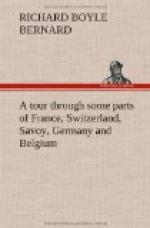The town or great village of Burscheid adjoins the gates of Aix; it is very flourishing. Near it is a fine abbey. I was also pleased with the ruins of the Castle of Frankenberg. Here is a manufactory of needles, and about Aix are several of cloth.
From the Tower of Sittard is a view of vast extent over the Netherlands. The cathedral of Aix is a large Gothic structure, but many of its decorations are trifling, and inconsistent with the solidity of its massy columns of marble and granite. Its doors are of bronze highly wrought, but full of fissures.
The streets here are crowded with beggars; and I think I never was in a place where so little respect is paid to the observance of Sunday. In most towns on the continent the theatres, &c. are open, but most of the shops are closed during some part of the day; here they were open during the whole day, and seemed equally busy as during the rest of the week.
The country between Aix and Liege produces great quantities of hops (the vine of the north of Europe), and the beer here is very good. Clermont is a neat village, with several good houses.
We passed over some mountains, which seem to be the limit of the German language; the inhabitants of them speak a dialect intelligible neither at Liege nor Aix.
The country near Liege is rich, and the city is situated in a beautiful valley on the Meuse; it is extremely large, but is ill built, and the streets are more intricate and dirty even than those of Cologne. There is a good deal of trade carried on here, and the population is estimated at not less than 50,000. There are a great number of churches, but I was not much struck with any of them; that of the Dominicans is said to be copied from St. Peter’s at Rome. There are a great number of booksellers here, and I was told it was a famous place to procure cheap books. The coal here seems of good quality, and the place is surrounded with collieries. The lower orders in this city speak a jargon called Walloon, which is completely unintelligible to the higher classes.
The French customs are generally prevalent here; and it is said, the inhabitants regret their separation from France. There were vast manufactories of cutlery here, but the French, before their departure, destroyed most of the machinery; this, together with the failure of other trades, is said to produce the distress which fills the streets with beggars.
The general appearance of the inhabitants of Liege is not more prepossessing to a stranger than that of their city. There are said to be a great number of thieves, and I saw some surprised whilst cutting the trunks from behind a carriage at the inn-door. The money here is extremely adulterated, and is not taken one stage from the city, a circumstance which frequently is attended with great loss to the traveller, if he has occasion to receive much change.
In this neighbourhood are several vineyards, but the climate is too cold to admit of the wine having a good flavour. They here cultivate a species of cabbage, the seed of which produces a thick oil, which is used in dying stuffs, and forms part of the composition of the black soap of this country.




